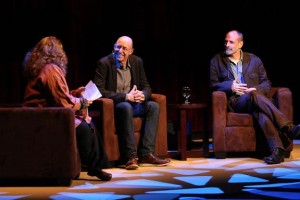Food, Inc. challenged student food beliefs
According to Food, Inc., the 2008 documentary film about corporate farming, we are all walking Doritos with limbs, fed primarily by big evil corporations.
These big corporations were the main topic of Wednesday night’s discussion between best-selling authors Eric Schlosser and Michael Pollan, held at Bovard Auditorium moderated by KCRW’s Good Food radio host Evan Kleiman.

Monopolies · Michael Pollan (left) and Eric Schlosser discussed the control of big companies over the meat-packing industry, as well as how the public can take the power over food from the government. - Carlo Acenas | Daily Trojan
“The power of big corporations like ConAgra, Monsanto and Walmart is incredible,” Schlosser said. “They are the ones pulling all the strings behind the government and the food we eat.”
Both Schlosser and Pollan are active figures in issues pertaining to food sustainability and industries. They did years of investigative work on food politics and production, exposing the government’s role in unsanitary and discriminatory farm practices through detailed, no-holds-barred books that shocked the country.
Pollan’s In Defense of Food: An Eater’s Manifesto won the James Beard Award and Schlosser’s Fast Food Nation stayed at the New York Times’s best-sellers list for two years.
Meanwhile, Kleiman is founder of the Slow Food Chapter in Los Angeles and also serves in the Stewardship Council of Roots of Change, both which are organizations promoting a sustainable food system.
Debating Walmart’s recent five-year plan to repackage its food to include lower amounts of unhealthy salts, fats and sugars, both Schlosser and Pollan were hopeful, but critical.
“Walmart is the biggest grocery store that feeds 40 percent of America,” Pollan said. “I think if they figure out how to [offer healthier products] profitably, there can be significant changes.”
Scholosser offered a more cynical view.
“The real problem, however, is still that there shouldn’t be any companies that powerful,” Schlosser said. “Ultimately it’s about unchecked power, and how corruptive it is.”
According to Pollan and Schlosser, the idyllic days of local farmers and happy cow pastures are over. The food industry has changed drastically. Farms are getting bigger and producing more, but according to Schlosser and Pollan, these “specialty crops” subsidized by the government never actually enter the consumer’s mouth.
“Over 75 percent that [the farmers] produce is fed to livestock,” Pollan said. “The remainder is turned into ethanol to feed our cars. Even so, 50 percent of food grown for humans is thrown away, uneaten.”
Because of America’s deeply complicated food politics, Pollan and Schlosser said the public is often misinformed about what they eat.
Pollan’s deceivingly simple food motto, “Eat food. Not too much. Mostly plants,” trails into more intense debates from the inaccessibility of expensive organic and health products for the vast majority of America to the obscure yet prominent lobbying and power food farming corporations have over politics.
Parisa Rezvani, a graduate student studying visual anthropology, said she found the discussion to be interesting.
“I hope this talk can accurately inform students because food politics is often confusing and there’s a lot of misinformation,” Rezvani said.
Meanwhile, Michael Zarky, 64, who has been vegetarian for 44 years, said he thinks people need to be more wise with their spending.
“The food movement is mostly for the upper-middle class only,” Zarky said. “People need to stop spending money on stupid things and support local farmers.”

I don’t believe one could call this a discussion. it is much more of a one-sided lovefest for the foodie “religion.”
See, that’s my Opinion. Mr. Pollan and Mr. Schlosser have their opinions too, and tend to continually state them as fact. Couple that with an underlying hatred for capitalism and a warped view on modern agriculture and you have two very charming, controversial pot-stirrers….
If we could feed the planet the same way we did 20 years ago, 50 years ago, or 100 years ago, we would have not needed to devote the years of research and development into agriculture.
PS…Organic means “we can only spray some of this stuff that’s approved” and more often than not, the organic produce is sprayed and fertilized much heavier than standard crops.
Always remember.
Hug your friendly farmer, they enjoy feeding you, even though they’re made out to look like criminals by these guys.
Last night’s event was great. Thanks for the recap.
I think the writer misinterpreted the use of the phrase “specialty crops.” The panel was making the point that the biggest farmers these days are not growing food for human consumption, for the most part they’re growing crops that are fed to livestock or used for ethanol production.
The phrase “specialty crops” is how farmers refer to the kinds of things we see at farmers markets, i.e. things people actually eat. The problem being that crops grown for human consumption shouldn’t be a “specialty” but rather the norm.
Rob- It’s hard to sell Bok Choy, Pearl Barley, and Hard Shell Gourds exclusively and raise a family/cover costs/and now pay more extravagant property taxes courtesy of the Williamson Act being taken away from us farmers.
Unfortunately, the first things to go are the specialty crops for most… The seed costs more, the yields don’t make up for it, and in the end, farming isn’t only a passion, it is also a business.
And yes, Corn is fed to livestock, which is fed to a majority of Humans.
There are bigger problems out there..the threat to halt technological innovation in Agriculture. Could you imagine living with computers from the 1950s… now what about our food supply? That’s the way that Pollan and Schlosser want us to go… And they want it via regulation rather than capitalistic ways.